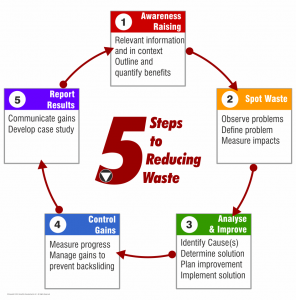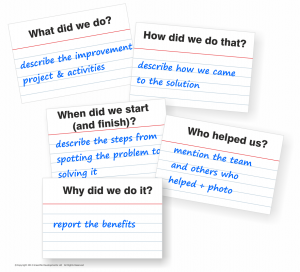Sustainability is a part of our working life. In our organisations, there are specialists who deal with legislation, sustainable purchasing, building management and also make the sustainability posters we see at work. As for the rest of us? Well, we tend to get told what to do by these specialists.
Being told what to do may be right for health and safety issues, but sustainability? Not really. Sustainability belongs to all of us. We all have a stake in it. But when people get orders on what to do, a lot of us just do enough because we are busy. However, “enough” isn’t enough when it comes to sustainability, it is really about doing more and doing better.
So what should the rest of us do to make sustainability happen – more and better?
I believe that probably the simplest, easiest and very low cost approach is to reduce waste at work. Waste isn’t just the things which ends up in bins, but also all the activities that results in our bins being filled. Waste is the opposite of sustainability: it costs money, it makes people unhappy because nobody likes to see their efforts become waste. The environmental impacts of waste is more than just that from the waste itself, it is also all the on-going background activities like heating and ventilation, lighting, hot water etc – all of these are continuous whether we are delivering value or creating waste.
In other words: by reducing waste, an anti-sustainability, we are doing sustainability. It is simple and easy to do and everyone at work can take part and with it, take ownership of sustainability.
Following on from above, it is not difficult to start a waste reduction initiative on a Sustainability Initiative for the Rest of Us. A simple five-step plan is described in diagram 2.
1. Raise Awareness – make sure your colleagues have the right information to make the necessary decisions about waste.
2. Spotting Waste – this is about looking for activities that does not really make a lot of sense. Actions that seemed not to benefit our organisation or people using our products and services. Finally, look for processes that may be out of date or too complex. Get rid of the former and simplify the latter.
Describe the spotted waste clearly with no ambiguities (what is it, where is it, who does it affect and when did it first appear) and then quantify it so that we have an idea of the impacts (for example: 1=low and 5=high).
3. Analyse and Improve – once you spotted the waste, then keep ask “Why?” until you get to the bottom of it. The “becauses” that come with the “whys” offer quick clues to what the solutions can be. Usually 5 rounds of asking Why? should suffice in getting to the root cause, but be pragmatic because the root cause, which may be more staff or a bigger budget, may not always be resolved easily. If that is the case, go back up one “Why” and solve it there.
From the root cause, you should find the solution quite quickly as the “because” tends to lead towards a solution.
Design a timetable; set realistic, sensible and achievable targets; and get on with implementing the improvement.
4. This is when your improvement has worked and you need to make sure it stays that way. You don’t want to solve the same problem again in six months time. Probably the best way is to record the gains from the improvement and then get agreement to turn it into a new working method. Make sure you have clear guidance ready for your colleagues to work the new way.
5. Now you can show off your improvement. Communicate your improvement project upwards to the big boss and sideways to the organisation newsletter. Write up a simple case study to describe it and remember to include a team photo so everyone can look good.
Once you’ve done sustainability this way, you will often notice that people are seeing you as an expert, so it’s time for you to explain to them what sustainability for the rest of us is all about!
For more information on reducing waste, please visit: www.nowaste.org.uk
Uly Ma is the Principal Consultant at Greenfile Developments Ltd, his sustainability programmes were deployed as part of the London 2012 construction programmes. His book, No Waste, is published by Gower/Ashgate: www.ashgate.com







Recent Comments